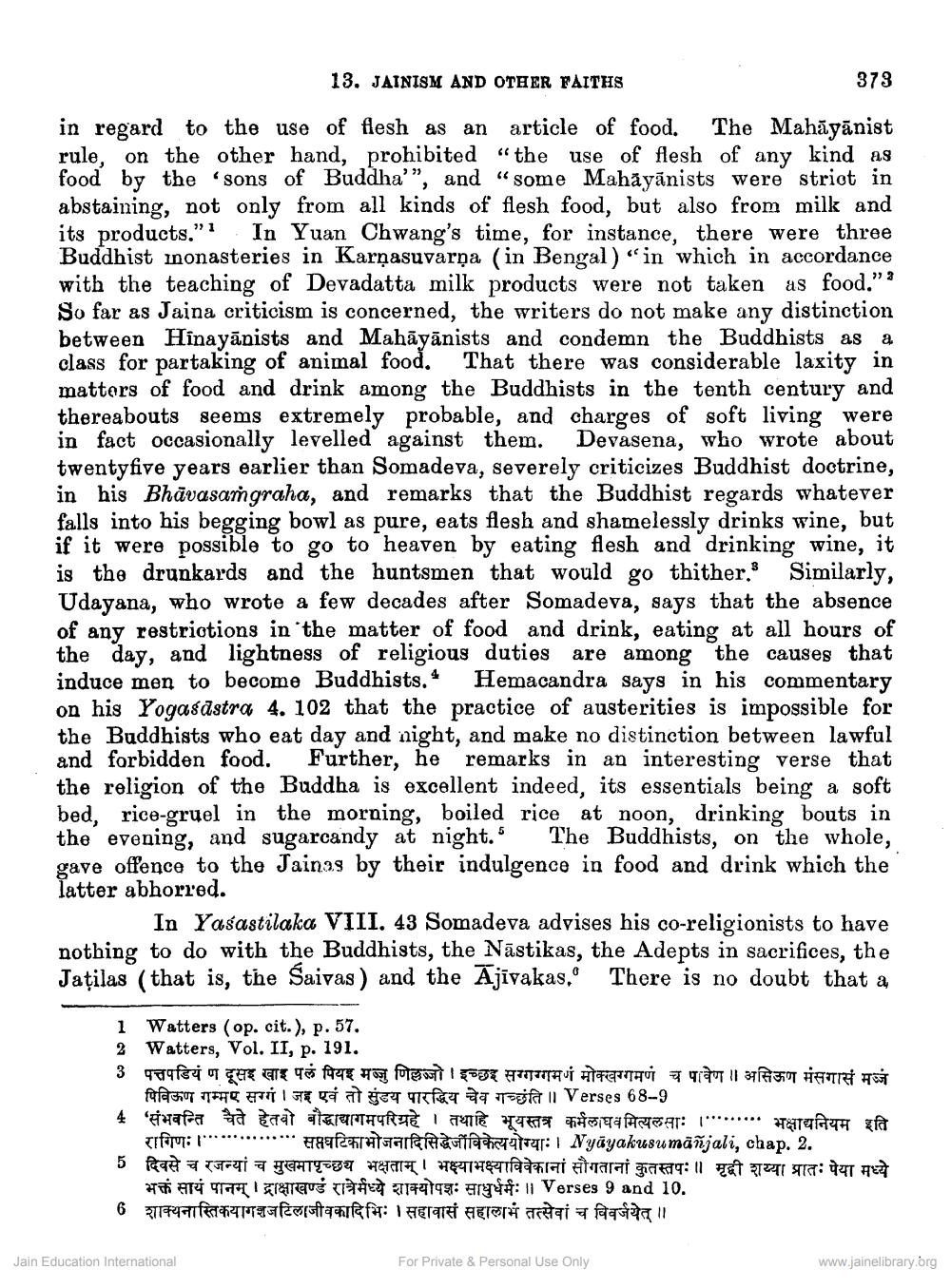________________
13. JAINISM AND OTHER FAITHS
in regard to the use of flesh as an article of food. The Mahayanist rule, on the other hand, prohibited "the use of flesh of any kind as food by the sons of Buddha"", and "some Mahāyānists were strict in abstaining, not only from all kinds of flesh food, but also from milk and its products." In Yuan Chwang's time, for instance, there were three Buddhist monasteries in Karṇasuvarna (in Bengal) "in which in accordance with the teaching of Devadatta milk products were not taken as food." " So far as Jaina criticism is concerned, the writers do not make any distinction between Hinayānists and Mahāyānists and condemn the Buddhists as a class for partaking of animal food. That there was considerable laxity in matters of food and drink among the Buddhists in the tenth century and thereabouts seems extremely probable, and charges of soft living were in fact occasionally levelled against them. Devasena, who wrote about twentyfive years earlier than Somadeva, severely criticizes Buddhist doctrine, in his Bhāvasaṁgraha, and remarks that the Buddhist regards whatever falls into his begging bowl as pure, eats flesh and shamelessly drinks wine, but if it were possible to go to heaven by eating flesh and drinking wine, it is the drunkards and the huntsmen that would go thither. Similarly, Udayana, who wrote a few decades after Somadeva, says that the absence of any restrictions in the matter of food and drink, eating at all hours of the day, and lightness of religious duties are among the causes that induce men to become Buddhists." Hemacandra says in his commentary on his Yogasastra 4. 102 that the practice of austerities is impossible for the Buddhists who eat day and night, and make no distinction between lawful and forbidden food. Further, he remarks in an interesting verse that the religion of the Buddha is excellent indeed, its essentials being a soft bed, rice-gruel in the morning, boiled rice at noon, drinking bouts in the evening, and sugarcandy at night." The Buddhists, on the whole, gave offence to the Jainas by their indulgence in food and drink which the latter abhorred.
373
In Yasastilaka VIII. 43 Somadeva advises his co-religionists to have nothing to do with the Buddhists, the Nastikas, the Adepts in sacrifices, the Jatilas (that is, the Saivas) and the Ajivakas. There is no doubt that a
1 Watters (op. cit.), p. 57.
2 Watters, Vol. II, p. 191.
3 पत्तपडियं ण दूसइ खाइ पलं पियइ मज्जु णिलज्जो । इच्छर सग्गग्गमनं मोक्खग्गमणं च पावेण ॥ असिऊण मंसगासं मज्जं पिविऊण गम्म सग्गं । जइ एवं तो सुंडय पारद्धिय चेव गच्छंति || Verses 68-9
4 'संभवन्ति चैते हेतवो बौद्धाद्यागमपरिग्रहे । तथाहि भूयस्तत्र कर्मलाघवमित्यलताः ।भक्षाद्यनियम इति रागिणः ।....... Nyayakusumāñjali, chap. 2.
5 दिवसे च रजन्यां च मुखमापृच्छथ भक्षताम् । भक्ष्याभक्ष्याविवेकानां सौगतानां कुतस्तपः ॥ मृद्वी शय्या प्रातः पेया मध्ये
भक्तं सायं पानम् । द्राक्षाखण्डं रात्रेर्मध्ये शाक्योपज्ञः साधुर्धर्मः || Verses 9 and 10.
I
6 शाक्यनास्तिकयागशजटिला जीवकादिभिः । सहावासं सहालाभं तत्सेवां च विवर्जयेत् ॥
Jain Education International
For Private & Personal Use Only
www.jainelibrary.org




